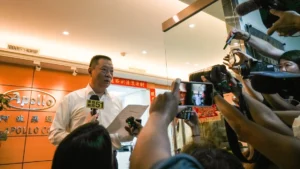What we know about the Taiwanese firm caught up in Lebanon’s exploding pagers attack

Hsu Ching-kuang, founder of Taiwanese company Gold Apollo, speaks to the media outside the company’s office in New Taipei City on September 18.
The deadly simultaneous explosions triggered by hundreds of pagers carried by Hezbollah members in Lebanon have thrust a little-known Taiwanese electronics manufacturer into the global spotlight, after its damaged products were identified in images following the attack.
At the non-descript offices of Gold Apollo on the outskirts of the Taiwanese capital on Wednesday, the founder of the company, Hsu Ching-kuang, vehemently denied making the pagers used in the massive assault. Instead, he said the devices were made by a European firm that had licensed his brand.
“Of course, I feel like a victim,” Hsu told reporters shortly before police officers arrived to carry out an investigation. “I’ve been going about my own business for 30 years, why am I suddenly roped into this?”
Multiple photos from the Tuesday attacks appearing to show damaged pagers bearing the Gold Apollo trademark has heightened scrutiny of the company, especially after the New York Times reported, citing unnamed sources, that Israel hid explosives inside the devices and added a switch in each one, which was later used to detonate them remotely.
The production of pagers is highly regulated in Taiwan due to their transmission functions, with authorities conducting regular inspections, a senior Taiwanese security official told CNN on Wednesday.
Gold Apollo’s pagers had met all standards and nothing unusual was found, according to the official, who did not provide further details about the inspection. Authorities are additionally looking into the company’s claim that it had outsourced production to Europe, they added.
Gold Apollo has been making a wide range of devices from pagers – wireless devices that can send messages without an internet connection commonly used by emergency services and hospitals – to buzzers used by restaurants since its 1995 founding, according to the company’s website.
It works with distributors around the world to sell its products, the firm said in a previous media report, once touting itself as one of the largest suppliers of walkie talkies and pagers in the US and Europe and counting intelligence agencies and emergency services among its clients.
Hsu said on Wednesday the pagers identified in media reports in Lebanon were manufactured and sold by a European partner, which established a relationship with his firm about three years ago.
In a statement issued later in the day, Gold Apollo identified the distributor, a Budapest–based company called BAC Consulting, and said it had licensed its trademark for sales in designated regions.
“The design and manufacturing of the products are solely the responsibility of BAC,” the statement said.
CNN has attempted to reach BAC through the website that Gold Apollo gave to reporters.